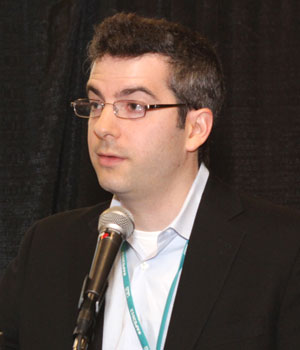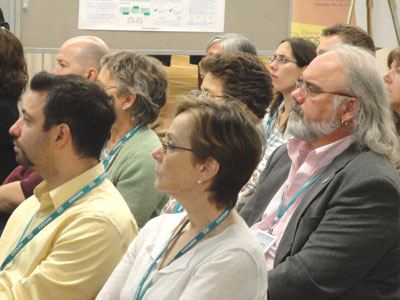Papers With a Purpose: The APS Wikipedia Initiative’s First Year

Jonathan A. Obar explains how Wikipedia enriches students’ classroom experience.
Want to know what zygomaticus means? Chances are you’ll Google it, and Google will point you to Wikipedia. With 450 million unique hits, and a total of 6 billion hits every month, Wikipedia is the fifth most-popular website in the world and has been deemed the “largest collaborative project known to man.” In 2011, then APS President Mahzarin R. Banaji challenged the APS community to get involved by improving psychology-related articles through the APS Wikipedia Initiative (APSWI). One year later, five participants in the APSWI came together to share the benefits and detail the challenges they faced with a huge crowd at the 24th APS Annual Convention in Chicago.
“Wikipedia assignments begin where traditional assignments leave off,” said Michigan State University scientist Jonathan A. Obar. Students are still learning course-related content, but Wikipedia adds digital-literacy training and forces students to interact with people who have varying levels of science understanding.
Paula Marentette, from the University of Alberta, Canada, also found that APSWI assignments transform students from passive readers of psychological literature to active knowledge translators. She used a Wikipedia writing assignment in two small, senior psycholinguistics seminars. She found that her students struggled at first, but learned much from the Wikipedia editors as they strived to achieve Wikipedia’s coveted “good status” for their articles.

Audience members learn how Wikipedia helps students build bridges from classroom to real-world experience.
Cognitive psychologist Steve Joordens, from the University of Toronto Scarborough in Canada, believes the APSWI provides students with effective practice for solving real-world problems.“You can do it in any class,” he said. “It’s really a good thing to enhance deep learning skills and another tool we can use to keep our students in the mental gym.”
Providing students with four years of this practice, he said, would make these learning skills seem more natural and provide students with crucial skills for the digital age.
Despite their different experiences, one benefit was echoed by all: purpose. Term papers usually end up in a file cabinet or the garbage, viewed by one, or maybe two, people. With the APSWI, students get to make a tangible impact on the world. At Davidson College, 29 undergraduates in Margaret P. Munger’s 200-level course produced over 220 references that received approximately 6,000 page views per month. In her 400-level class, 12 undergraduates produced 180 references, garnering 9,000 page views per month.
Students aren’t the only ones who benefit from the practical nature of Wikipedia assignments. “One thing I want to point out is that this is an example of civic engagement,” said Munger, who emphasized that professors can use the APSWI to contribute in a tangible way to their school or department’s mission statement. “I have never been able to do a service project in teaching psychcopthy…until the APS Wikipedia Initiative.”





APS regularly opens certain online articles for discussion on our website. Effective February 2021, you must be a logged-in APS member to post comments. By posting a comment, you agree to our Community Guidelines and the display of your profile information, including your name and affiliation. Any opinions, findings, conclusions, or recommendations present in article comments are those of the writers and do not necessarily reflect the views of APS or the article’s author. For more information, please see our Community Guidelines.
Please login with your APS account to comment.